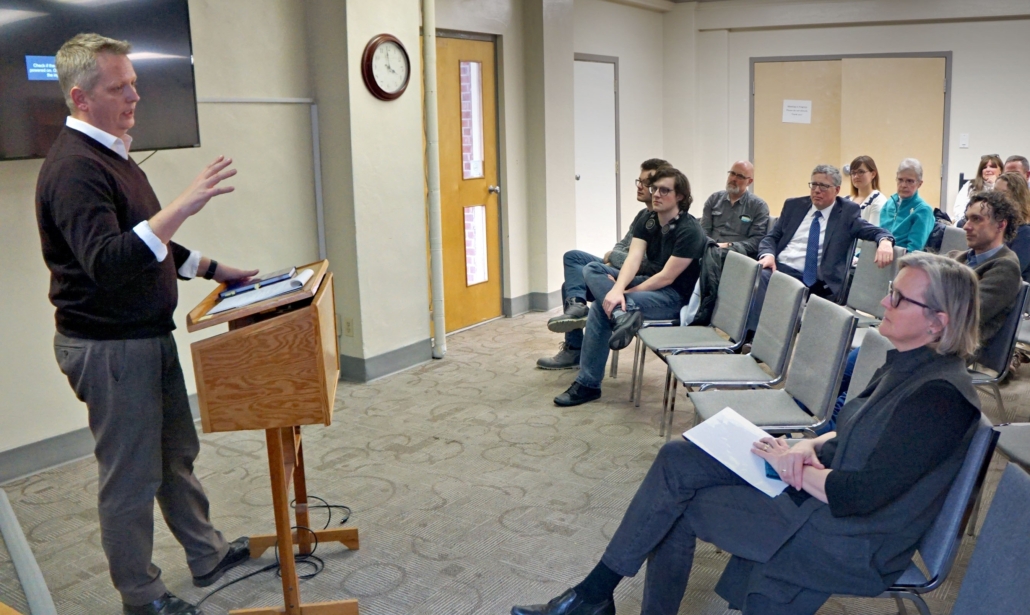Jesus is both perfectly human and perfectly divine. It’s a challenging concept, but Dr. Matthew Kostelecky helps us understand that as part of the “I Believe” catechesis series on the Nicene Creed.
“I hope people will take away something of the pecularly Christian claim that God became human, while also remaining God,” said Kostelecky, a professor of philosophy and the academic dean at St. Joseph’s College, University of Alberta.
“The presentation aims to help Catholics articulate, for themselves and others, why the Incarnation is so fundamental to our faith.”
This 2025 Jubilee Year marks the 1,700th anniversary of the first ecumenical council in Nicea, which developed the creed. To mark the occasion, the Archdiocese of Edmonton has launched “I Believe”, a catechesis series in partnership with St. Joseph’s College, University of Alberta and Newman Theological College
Kostelecky’s presentation is the fourth in the seven-part Nicene Creed Series, and will focus on the proposition from the Creed:
“For us men and for our salvation he came down from heaven, and by the Holy Spirit was incarnate of the Virgin Mary, and became man.
For our sake he was crucified under Pontius Pilate, he suffered death and was buried, and rose again on the third day in accordance with the Scriptures.
He ascended into heaven and is seated at the right hand of the Father.
He will come again in glory to judge the living and the dead and his kingdom will have no end.”
Among the questions Kostelecky addresses are:
- What it means that Jesus was “incarnate of the Virgin Mary,” such that he became human
- Why the focus on crucifixion, suffering, death, and resurrection?
- Why do we believe he ‘ascended’ into Heaven and what it might mean that his “kingdom will have no end.”
“The Creed is important today as a basic “symbol” of our faith,” Kostelecky explained.
“Symbol” here means something different in an older context, when the Creed was sometimes simply called the “Symbol of Faith. The roots here are important: σύμβολον (sym-bolon) or syn- (with, together) + ballein (to throw), meaning ‘to throw together.’
He noted: “The Creed, therefore, pulls the many members of the Body of Christ into a basic unity, which traverses the whole of the Christian community, from all places and times. In a fractured and fragmented world, the Creed provides a basic stability within the flux of our Christian lives.”
As an expert in medieval philosophy, Kostelecky said the importance of the Nicene Creed can’t be understated.
“My study interests cover medieval (and, to a point, ancient) accounts of how humans relate to and understand God. To say that the Creed was important to medieval Christian thinkers significantly undersells the situation, and it comes up all over the place in thinkers as diverse as St. Augustine, St. Hildegard of Bingen, St. Thomas Aquinas, Bl. John Duns Scotus, and St. Theresa of Avila.
“The Creed – especially in the parts that I am going to be talking about – focuses on the humanity and the divinity of Jesus, and I think a lot about how humanity and divinity relate to each other.”
– Matthew Kostelecky received his PhD in medieval philosophy from the Catholic University of Leuven, where he focused on the thought of St. Thomas Aquinas, and his publications centre mostly on the thought of Aquinas. He has taught philosophy at St. Joseph’s College, University of Alberta since 2009 and became Dean at St. Joseph’s College in 2020. He and his wife Michelle have three adult children Isaac, Ella, and Marcus
For more stories, subscribe to the Window newsletter
Watch series:

